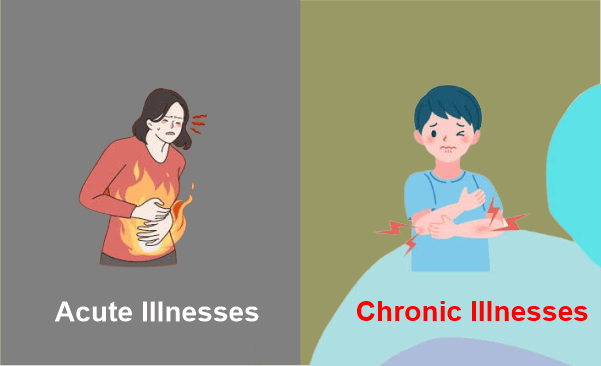Unlocking Optimal Health: A Holistic Guide to Chronic and Acute Conditions
In the realm of healthcare, achieving the delicate equilibrium between addressing chronic and acute conditions is paramount for overall well-being. Let’s embark on a journey to explore holistic approaches that transcend the mere management of symptoms and delve into the roots of these health challenges.
Understanding Chronic Conditions
Defining Chronic Ailments
Chronic conditions, Acute Conditions characterized by their persistence, demand a nuanced comprehension. Ranging from cardiovascular issues to autoimmune disorders, these health concerns necessitate a long-term, holistic perspective. Our comprehensive approach extends beyond symptom control to target the underlying causes of chronic ailments.
Holistic Treatment Strategies
Holistic healthcare revolves around the integration of various therapies, encompassing the physical, mental, and emotional facets of well-being. Incorporating practices such as mindfulness, nutrition optimization, and regular physical activity becomes pivotal in effectively managing chronic conditions. By addressing lifestyle factors, we empower individuals to actively engage in their healing journey.
The Role of Integrative Medicine
In the spectrum of chronic illness, integrative medicine emerges as a beacon of hope. This approach seamlessly blends conventional and complementary therapies to provide a well-rounded treatment plan. Acupuncture, herbal remedies, and mind-body interventions intertwine harmoniously, creating a personalized healing roadmap that respects individual needs.
Navigating Acute Conditions
Defining Acute Health Challenges
While chronic conditions require sustained attention, acute ailments demand immediate and precise intervention. From infectious diseases to sudden injuries, acute health issues necessitate swift and targeted responses.
Timely Medical Interventions
In the realm of acute conditions, prompt medical attention is non-negotiable. Swift diagnosis and pharmacological interventions form the cornerstone of managing acute health crises. It’s essential to understand that a holistic approach to acute conditions doesn’t diminish the importance of conventional medical practices but complements and enhances them.
Holistic Emergency Care
Even in urgent situations, holistic principles can be applied. Integrating stress management techniques, ensuring adequate nutrition, and incorporating mind-body practices during recovery can contribute to a holistic recuperation process.
Essential Guidelines for Managing Acute Conditions
When faced with an acute health condition, it’s crucial to act swiftly and effectively. Here are essential guidelines to help you navigate through such situations:
1. Assess the Severity:
- Evaluate the seriousness of the condition. If it’s life-threatening, seek emergency medical attention immediately.
2. Call Emergency Services:
- For severe symptoms such as chest pain, difficulty breathing, severe injuries, or loss of consciousness, call emergency services (911 or your local emergency number) right away.
3. First Aid:
- Administer basic first aid if necessary and if you’re trained to do so. This may include controlling bleeding, providing CPR, or managing fractures.
4. Seek Immediate Medical Attention:
- If the condition is urgent but not immediately life-threatening, go to the nearest urgent care center or emergency room.
5. Contact Healthcare Provider:
- If it’s not an emergency but requires prompt attention, contact your primary care physician or healthcare provider. They can advise you on the next steps, which may involve scheduling an urgent appointment.
6. Medication Management:
- If the acute condition involves medication, follow the prescribed dosage and instructions. Do not self-adjust medication without consulting a healthcare professional.
7. Follow-Up Appointments:
- Attend any follow-up appointments recommended by healthcare providers to monitor progress and adjust the treatment plan if necessary.
8. Rest and Recovery:
- Adequate rest is often crucial for recovery. Follow any recommendations for rest and activity restrictions provided by healthcare professionals.
9. Stay Hydrated and Nourished:
- Maintain proper hydration and nutrition to support your body’s recovery. Follow any dietary recommendations from healthcare providers.
Remember, these are general guidelines and may not cover every situation. Always consult with a healthcare professional for advice tailored to your specific condition. Your health and well-being are of utmost importance, and these guidelines aim to assist you in making informed decisions during critical moments.
The Synergy of Holistic Approaches
Bridging the Gap between Chronic and Acute Care
Recognizing the interconnectedness of chronic and acute conditions is pivotal. Holistic approaches create a bridge between these seemingly disparate realms. Strategies effective in chronic conditions often inform acute care, and vice versa, fostering a more unified and impactful healthcare model.
Empowering Individuals
At the core of our approach lies the empowerment of individuals in managing their health. Education on preventive measures, lifestyle adjustments, and self-care practices form the foundation of our commitment to holistic healthcare. We envision a world where individuals are not just passive recipients of medical care but active participants in their well-being.
Conclusion
In the intricate tapestry of healthcare, our commitment to holistic approaches stands as Acute Conditions of comprehensive well-being. From chronic conditions demanding long-term strategies to acute health crises requiring immediate attention, our approach is rooted in the synergy of conventional and complementary therapies. We believe in empowering individuals to navigate their health journey with knowledge, resilience, and a holistic perspective. Discover the path to optimal health through holistic care that cherishes the mind, body, and spirit.
